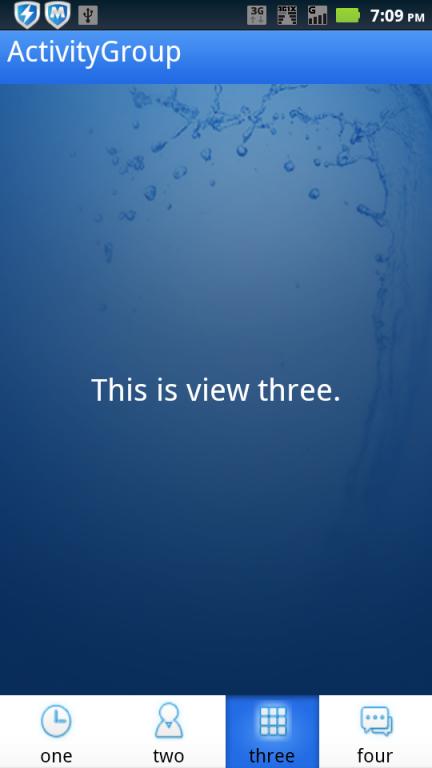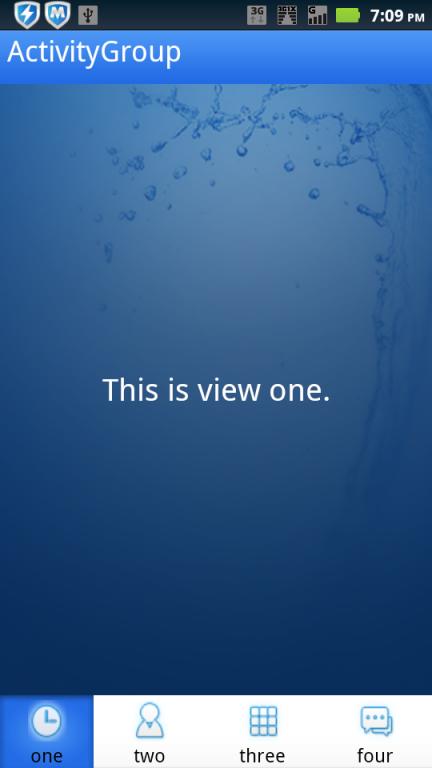android.app包中含有一个ActivityGroup类,该类是Activity的容器,可以包含多个嵌套进来的Activitys,这篇文章就是借助ActivityGroup可以嵌套Activity的功能来实现Tab功能。tab这种UI在很多的移动应用中可以看到,包括android、iphone、window phone7等移动终端上都有这样的应用,Tab这种UI方式具有小视图大容量的特点。 首先,从SDK中doc文档中都可以获知,ActivityGroup类的父类是Activity(见下图),也就是说二者具有相同的接口和生命周期,同Activity一样,也有onCreate()、onPause()等函数可供我们重载。
ActivityGroup中有两个public方法(下图):ActivityGroup中可以调用getLocalActivityManage()方法获取LocalActityManage来管理Activity。
ActivityGroup实现的tab功能的效果图如下。
先看一下java代码:
- public class MainView extends ActivityGroup {
- @SuppressWarnings("unused")
- private LinearLayout bodyView,headview;
- private LinearLayout one, two, three, four;
- private int flag = 0; // 通过标记跳转不同的页面,显示不同的菜单项
- /** Called when the activity is first created. */
- @Override
- public void onCreate(Bundle savedInstanceState) {
- super.onCreate(savedInstanceState);
- setContentView(R.layout.view_main);
- initMainView();
- // 显示标记页面
- showView(flag);
- one.setOnClickListener(new OnClickListener() {
- public void onClick(View v) {
- // TODO Auto-generated method stub
- flag = 0;
- showView(flag);
- }
- });
- two.setOnClickListener(new OnClickListener() {
- public void onClick(View v) {
- // TODO Auto-generated method stub
- flag = 1;
- showView(flag);
- }
- });
- three.setOnClickListener(new OnClickListener() {
- public void onClick(View v) {
- // TODO Auto-generated method stub
- flag = 2;
- showView(flag);
- }
- });
- four.setOnClickListener(new OnClickListener() {
- public void onClick(View v) {
- // TODO Auto-generated method stub
- flag = 3;
- showView(flag);
- }
- });
- }
- /*
- * 初始化主界面
- */
- public void initMainView() {
- headview=(LinearLayout) findViewById(R.id.head);
- bodyView=(LinearLayout) findViewById(R.id.body);
- one=(LinearLayout) findViewById(R.id.one);
- two=(LinearLayout) findViewById(R.id.two);
- three=(LinearLayout) findViewById(R.id.three);
- four=(LinearLayout) findViewById(R.id.four);
- }
- // 在主界面中显示其他界面
- public void showView(int flag) {
- switch (flag) {
- case 0:
- bodyView.removeAllViews();
- View v = getLocalActivityManager().startActivity("one",
- new Intent(MainView.this, OneView.class)).getDecorView();
- one.setBackgroundResource(R.drawable.frame_button_background);
- two.setBackgroundResource(R.drawable.frame_button_nopressbg);
- three.setBackgroundResource(R.drawable.frame_button_nopressbg);
- four.setBackgroundResource(R.drawable.frame_button_nopressbg);
- bodyView.addView(v);
- break;
- case 1:
- bodyView.removeAllViews();
- bodyView.addView(getLocalActivityManager().startActivity("two",
- new Intent(MainView.this, TwoView.class))
- .getDecorView());
- one.setBackgroundResource(R.drawable.frame_button_nopressbg);
- two.setBackgroundResource(R.drawable.frame_button_background);
- three.setBackgroundResource(R.drawable.frame_button_nopressbg);
- four.setBackgroundResource(R.drawable.frame_button_nopressbg);
- break;
- case 2:
- bodyView.removeAllViews();
- bodyView.addView(getLocalActivityManager().startActivity(
- "three", new Intent(MainView.this, ThreeView.class))
- .getDecorView());
- one.setBackgroundResource(R.drawable.frame_button_nopressbg);
- two.setBackgroundResource(R.drawable.frame_button_nopressbg);
- three.setBackgroundResource(R.drawable.frame_button_background);
- four.setBackgroundResource(R.drawable.frame_button_nopressbg);
- break;
- case 3:
- bodyView.removeAllViews();
- bodyView.addView(getLocalActivityManager().startActivity(
- "four", new Intent(MainView.this, FourView.class))
- .getDecorView());
- one.setBackgroundResource(R.drawable.frame_button_nopressbg);
- two.setBackgroundResource(R.drawable.frame_button_nopressbg);
- three.setBackgroundResource(R.drawable.frame_button_nopressbg);
- four.setBackgroundResource(R.drawable.frame_button_background);
- break;
- default:
- break;
- }
- }
- }
程序中重要的是如下的方法:
- bodyView.removeAllViews();
- bodyView.addView(getLocalActivityManager().startActivity("two",
- new Intent(MainView.this, TwoView.class))
- .getDecorView());
使用view的removeAllViews()方法清除不需要的view,使用addView(View v)方法添加需要的view。 getLocalActivityManager().startActivity("two",new Intent(MainView.this, TwoView.class))得到一个window对象,window对象调用 getDecorView()获取view。关于window的方法可以参考android.app.Window。 通过tab的效果图可以看到这个效果使用了上、中、下三种布局,layout就可以这样做了。实现layout就可以实现tab功能了。 /**。
* @author 张兴业
* 邮箱:xy-zhang@163.com
* qq:363302850
*/

























